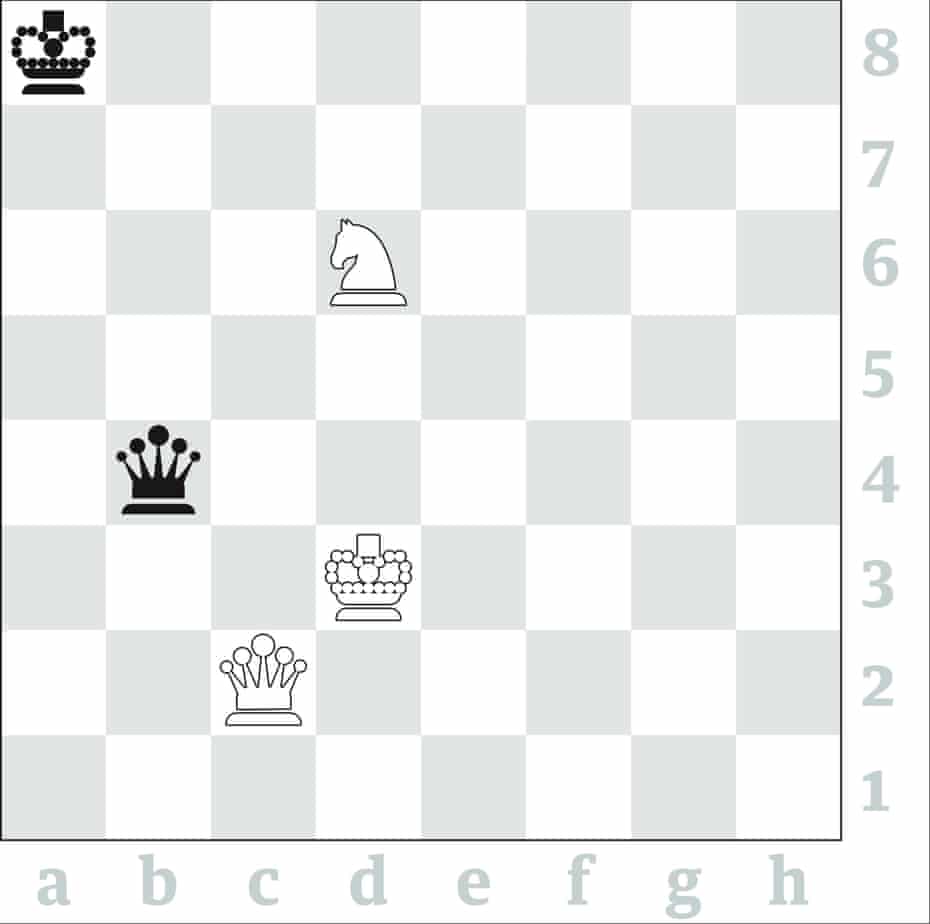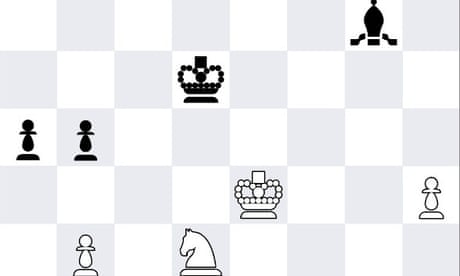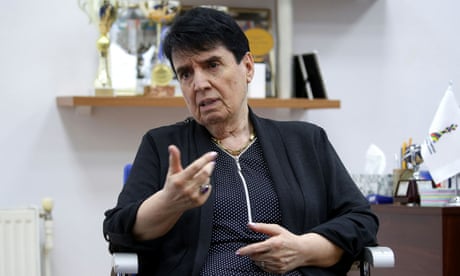The world champion won Tata Steel Wijk aan Zee for a record eighth time and felt ‘really good’ about his play

3801 White to move and win. This Yuri Averbakh puzzle, solved by a very brief but hard to spot sequence, is a birthday tribute to the world’s oldest grandmaster, who turns 100 on Tuesday. Averbakh was 1954 USSR champion, has written several fine endgame books, and is alongside Boris Spassky as the last two survivors of the golden Soviets. At 99, he overcame a hospital stay with Covid.
Leonard Barden
Thu 3 Feb 2022
Leonard Barden
Thu 3 Feb 2022
Magnus Carlsen was a class apart from his rivals last week at Tata Steel Wijk aan Zee, the “chess Wimbledon”. The No 1 capped a dominant performance with a virtuoso final game against an old rival, an unbeaten 9.5/13 total, and a record eighth victory. He has finished first at Wijk on more than half his appearances there, and the organisers have promised a gold-plated trophy if he makes it to 10 victories at the small Dutch North Sea resort.
Norway’s world champion, 31, said that he felt “really good about my play. To some extent I took the obvious chances and left the more difficult ones on the table, which suggests there’s still quite a bit of room for improvement, but overall I’m very happy.”
Carlsen reckoned to have had nine winning positions, but converted only five of them. He gained just three rating points, reaching 2868 in his stated quest for an all-time record 2900 rating, which he previously got within sight of in 2014 and 2019, when his peaks were 2889 and 2882.

Chess: Carlsen edges towards minimalist victory as Covid strikes at Wijk
Carlsen’s penultimate round endgame win against Fabiano Caruana, his opponent in the 2018 world title match, was a vintage demonstration of how active pieces, here the black bishops, can defeat a more powerful but passive army, here the white rooks.
However, it was his earlier game against Shak Mamedyarov, second on tie-break at Wijk, which attracted most praise, not least from the loser, who called it “an absolutely fantastic game… In 27 moves he played 25 engine first lines… I don’t know when I last lost like this without any chance.”
Carlsen said: “I think that was certainly my best game… I just made some very, very good decisions, and the way chess has become now, you judge yourself on whether the engines like your play, and whenever you feel like you’ve played a good game it’s nice to get that confirmed.”
The chess circuit moves to Berlin on Friday for the opening round of the Fide Grand Prix. This is a series of three elite tournaments, two in the German capital and one in Belgrade, which will decide the final two places in this summer’s eight-player Candidates in Madrid.
Those qualified so far are Alireza Firouzja (France) and Fabiano Caruana (US) from the Fide Grand Swiss, Jan-Krzysztof Duda (Poland) and Sergey Karjakin (Russia) from the World Cup, Ian Nepomniachtchi (Russia) as loser of the 2021 title match, and Teimour Radjabov (Azerbaijan) as Fide nominee.
Berlin began with a shock even before the first pawn was pushed. China’s world No 3, Ding Liren, the favourite in the eyes of many to win both the Grand Prix and the Candidates, withdrew due to visa problems so cannot now qualify as a Candidate. Ding has been very unlucky. His preparation for the 2020 Candidates was disrupted by a requirement to quarantine in Moscow before the tournament, while his results in the 2021 online Champions Tour were handicapped by poor internet connections and by playing hours which favoured his European and US rivals.
In Ding’s absence, the US has a strong hand in the Grand Prix, with Wesley So, Levon Aronian and Hikaru Nakamura all having chances, while Mamedyarov is in fine form after his success in Wijk. Several others, including Russia’s Alexander Grischuk and France’s Maxime Vachier-Lagrave, should also be in the frame. Rounds start at 2pm daily from Friday.
Two weeks from now, Carlsen begins the defence of his title in the online Meltwater Champions Tour, which opens on 19 February with the Airthings Masters. The format has been streamlined since last year. Won games now count for three points instead of two, while the quarter-finals and semi-finals are sped up from two days to one.
The field of 16 includes Ding, Nepomniachtchi, five teenagers led by the world rapid champion, Nodirbek Abdusattorov, 17, and the women’s world rapid champion, Alexandra Kosteniuk.
Carlsen is taking on a sizeable commitment in 2022 with his ambitious 2900 target while simultaneously playing the online tour with its different rhythms, challenges and time limits. Will it all prove too much, even for this exceptional world champion? Time will tell.
The men’s team won the £100,000 Battle of the Sexes match which finished on Thursday in Gibraltar, scoring a clear 53-47 margin. Teams were 10-a-side, while average ages and Fide ratings were closely matched. The women’s team had a strong start and were 13-7 ahead after two rounds, but their missed chances in good positions proved costly.
Olga Girya, the only Russian on the women’s team, surprised Joe Gallagher in the King’s Indian, an opening about which the former British champion has written several books. After the unusual 6 Be3!? e5 7 Qc2!? Qe7? 8 Nd5! White was already on top, and the blunder 19…Be8? only hastened defeat.
Have you ever heard Emanuel Lasker or José Capablanca speak, or Vassily Smyslov sing? Many keen chess fans could easily recognise the voices of most or all of the world champions from Boris Spassky to Carlsen, but audiotapes by earlier greats are rare.

First female chess grandmaster sues Netflix over false claim in Queen’s Gambit
Edward Winter’s online Chess Notes has just published a recording of Lasker, who held the world crown a record 27 years, interviewed during the 1935 Alexander Alekhine v Max Euwe title match.
One startling claim by Lasker is that Alekhine did not lose a game playing Black in the Ruy Lopez 1 e4 e5 2 Nf3 Nc6 3 Bb5 for around 30 years. The reality, still impressive, is that the unbeaten sequence was 16 years, from a 1921 game up to 1937, when Alekhine lost to Paul Keres at Margate in a famous 23-mover.
Capablanca, who beat Lasker in 1921 then lost to Alekhine in 1927, is heard talking in English when congratulated on his 50th birthday at Avro 1938.
Later that day the Cuban lost to Alekhine and had a poor finish to Avro, usually blamed on a mini-stroke during the tournament. However, Capablanca himself gave a different explanation in the course of a long and interesting interview at Buenos Aires 1939.
Smyslov, world champion 1957-58, once auditioned for the Bolshoi, and sometimes sang at the end of tournaments, accompanied by the concert pianist Mark Taimanov. Here he is on YouTube.
3801 1 Qc6+! Kb8 (if Ka7 2 Nb5+ wins) 2 Kc2! Black is in zugzwang (compulsion to make a losing move) becau
No comments:
Post a Comment